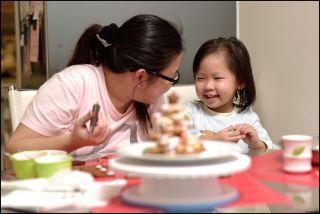Self-Harm
How Parents’ Stress Can Hurt Kids
New research finds a link between parental stress and later self-harm in children.
Posted April 8, 2024 Reviewed by Devon Frye
Key points
- New research finds a link between parents’ level of stress when the child was age 6 and later self-harm.
- The parent-child relationship remains crucially important in the healthy development of children.
- Your stress, even when your child is young, could influence the parent-child relationship in negative ways.
- It's important for parents to recognize and manage their stress, for their own benefit and their child's.
I’ve always disliked the common saying, “Big kids, big problems; little kids, little problems,” for a few reasons.
First, it invalidates or dismisses the concerns and questions of parents who are in the throes of raising little kids. It sends an unhelpful signal: “If you think this is hard, wait to see what things will be like when you have teenagers!”
Second, it implies there is no connection between how we deal with the “little problems” of little kids and how this may influence the types of issues these children face when they are older. It reduces childrearing to a series of sequential stages that are not necessarily connected to each other when, in reality, child development is much more nuanced than that.
Third, it lacks empathy and diminishes how excruciatingly vulnerable the brains of little kids are to psychological adversity. What an adult may view as a “little problem” might not feel little to the kid experiencing it.
Finally, it seems to imply the problem lies within the kid, thus downplaying the power parents and caregivers hold in creating, exacerbating, or resolving these problems via their own attitudes, behaviors, and ways of coping.
Why It’s Important to Pay Attention to Young Children’s Problems
A recent European study challenges many of the issues raised by this problematic saying. The research aimed to identify what factors predicted non-suicidal self-injury (NSSI) in adolescence by studying a group of 759 children, over time, starting from age 6, then age 12 and age 16.
Non suicidal self-injury is defined as the deliberate destruction of one’s body tissue e.g. via cutting or burning without suicidal intent. Self-injury, in these situations, is viewed as an unhealthy way to cope with psychological pain and stress that releases tension and eventually restores a sense of calm. Rates of NSSI increase sharply in adolescence; it is typically more common among girls than boys.

The researchers hypothesized that parents’ level of stress earlier in the child’s life would be one of the factors predicting NSSI in adolescence. They measured this stress using the parenting stress index, a validated self-report tool that assesses the magnitude of stress in the parent-child relationship in three key areas: characteristics of the child (e.g. demandingness, hyperactivity); characteristics of the parent (e.g. health, attachment, and competence); and general stress (e.g. financial, social isolation).
One of the most salient findings from the study was a link between the parents’ level of stress when the child was 6 years old and NSSI, in the same child, in subsequent adolescence.
The results of this study suggest that parental stress plays a role in increasing the risk of NSSI, whereas child-specific factors and exposure to negative events (e.g. the death of a close adult, serious vehicular accident, burn incidents, near-drowning incidents) did not. These findings hint at the uniquely powerful influence parents, and the quality of the parent-child relationship, exert in the healthy psychological development of children.
What Parents Can Do Now
The parent-child relationship remains a crucially important determinant in the healthy development of children—even though parenting, in today’s world, can sometimes feel disempowering and make us feel as though this is not the case.
Your own stress, even when your child is young, could influence the parent-child relationship in negative ways, leading to further complications for both later. If you are a new parent, it is vital to ensure you have the support you need as soon as possible. Possible action steps include:
1. Start early. When it comes to stress and parenting, think of your unique points of vulnerability as early as possible in your parenting journey. For example: are you a single parent? Does your child have special needs? Did you experience adversity in childhood? How might your relationship with your own parents influence your parenting style? In good ways? In not-so-good ways? Who are the people in your life you can turn to when you’re feeling stressed or overwhelmed? Are there other major sources of stress such as your finances, work, or a personal illness that you are dealing with?
Recognizing these areas will heighten your awareness of them and that in itself can help minimize negative repercussions. Furthermore, identifying them early allows an opportunity for proactively safeguarding against how these factors may negatively impact your ability to parent.
2. Be a role model to your child for how to proactively deal with stress in healthy ways. Aim to eliminate unhealthy ways of coping with stress in your own life.

3. Be kind to yourself. Perfection is overrated when it comes to parenting. Strive for a consistently healthy dynamic that is sustainable over time. Allow room for growth and learning for when things do not go as planned. In tough times, always remain compassionate to yourself and your child.
4. Be consistent. Even 30 minutes per day of stress-free bonding and playfulness (e.g. dinner time, bath time, and bedtime reading routines) with your child can do so much to protect the quality of your relationship. Ensure you are present in those moments and free of distractions.
5. Seek professional help. If you’re not getting the traction you need, feel consistently overwhelmed, or have concerns your child is struggling, it’s OK to ask for help. Find a therapist near you in the Psychology Today Therapy Directory.




